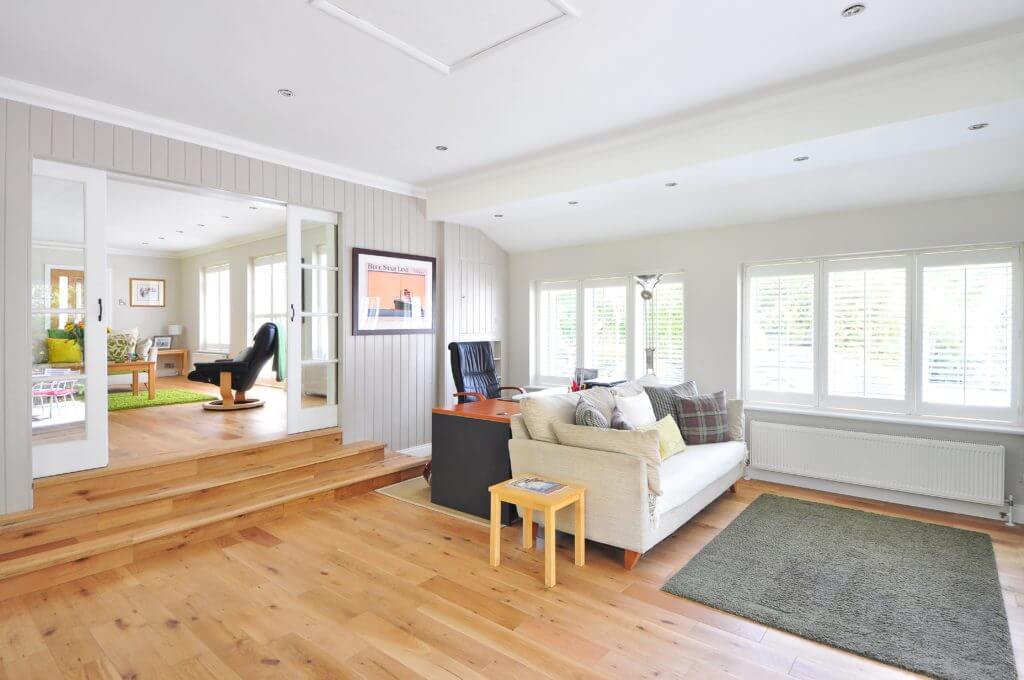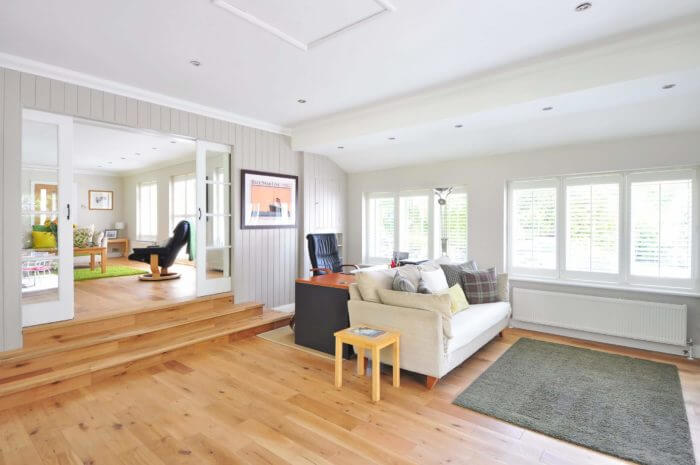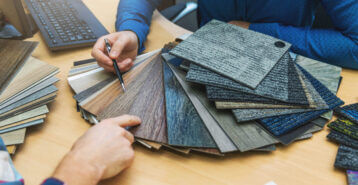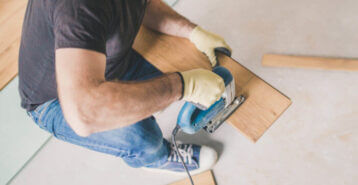Are you doing a flooring project?
Modernize can pair you with three to four pros in your area, so you can compare options and save time and money.
- What is Engineered Hardwood Flooring?
- Engineered Hardwood Flooring Quick Facts
- Where to Use Engineered Hardwood Flooring
- Where Not to Use Engineered Hardwood
- How is it Installed?
- How Long Does it Last?
- Does it Clean Easily?
- How Does it Stand Up to Wear and Tear?
- What Does Engineered Hardwood Cost?
- What is Maintenance Like?
- Engineered Hardwood Flooring and Resale Value
Durable, long-lasting, and resistant to moisture and warping, engineered hardwood flooring is popular among homeowners for many reasons, including its relative affordability. But if you are among those who are not familiar with its benefits, you may be wondering what engineered wood flooring is exactly, how it is made, and how it compares to solid wood flooring. In this article, we are answering all your engineered wood flooring questions from quality and installation to care and cost.

What is Engineered Hardwood Flooring?
Fans of engineered wood call it the best of both worlds – a real-wood flooring alternative with a few added benefits and a cheaper price tag.
Engineered wood is made by layering a veneer (or wear layer) of real wood over a plywood core. The thickness of the plank’s wear layer and core vary by manufacturer and will affect the flooring’s overall quality, strength, and longevity. Engineered hardwood planks are offered in more sizes than solid wood, but typically come in fewer wood species. Oak, maple, and cherry are the most common.
Once installed, many people will be hard-pressed to tell if a wood floor is solid plank or engineered. Manufacturers’ improvements to construction and overall quality have made engineered hardwood flooring almost indistinguishable from real solid hardwood. There are some notable differences, however, which will be addressed in more detail below.
Engineered Hardwood Flooring Quick Facts
Wear layer (wood) thickness: 1 mm to 3 mm
Plank thickness: ¼” to ¾”
Plank width: 2 ¼” to 7”
Lifespan: 20 to 40 years
Warranty: 10 to 30 years
Cost: $4 to $16 per square foot
Where to Use Engineered Hardwood Flooring
Engineered hardwood can be installed anywhere solid wood planks can go, and even in a few areas where it can’t. Its plywood core is constructed with multiple layers at 90-degree angles, resulting in a more stable substrate that can withstand some moisture and heat fluctuations.
Where Not to Use Engineered Hardwood
While engineered hardwood is more moisture-resistant than solid wood plank, it is not 100 percent waterproof. Most professional flooring installers would advise against wood in rooms with high amounts of water and moisture, like bathrooms and laundry rooms.
How is it Installed?
With its tongue and groove construction, engineered hardwood planks can lock together and “float” on top of an existing floor. You can install it over tile, laminate, or solid wood flooring as long as it is reasonably clean, in good condition, and level. The type of installation you choose may depend on your subfloor and your installer’s preference. Discuss with them the method that is right for your home.
Float It
Because this method requires no glue or fasteners, it is the simplest and easiest to install. Planks lock together like puzzle pieces without attaching to the existing floor or subfloor. For planks without a click-and-lock design, tongue and groove adhesive is required.
Find the Right Contractor for Your Flooring Project
Whether you’re ready to begin your project now or need some expert advice, our network of contractors are here to help. With a few simple questions, we’ll find the best local professionals for you
Glue It
While a floating floor provides a strong bond, you may require a bit more stability in higher traffic areas like living rooms and hallways. To glue engineered hardwood, a layer of flooring adhesive is applied to and spread along the subfloor. Planks are installed atop the adhesive and fit together as they do with the floating method.
Nail It
For heavy-duty installations, nailing the engineered planks using a nail gun is an option. This method requires a plywood subfloor. Planks are nailed down into a plywood subfloor (no concrete subfloors or existing vinyl or laminate floors can be in place for this installation method), and holes are covered with a matching wood filler.
Staple It
Stapling engineered wood planks is another way to secure them to a plywood subfloor. Staples can be punched into the tongue portion of each plank at a 45-degree angle every three or four inches.
How Long Does it Last?
With normal wear and tear, you can expect an engineered hardwood floor to last from 20 to 40 years. Manufacturers’ warranties range from 10 to 30 years on average, and most offer a lifetime guarantee against delamination.
Does it Clean Easily?
Life is messy and can easily spill out over floors, especially in households with kids and pets. Because of its solid wood veneer, engineered wood cleaning recommendations are similar to those for solid wood flooring. Use a microfiber cloth or broom for daily cleaning, followed by a weekly vacuum (be sure vacuum is at bare floor setting) and wipe down with wood flooring cleaner.
How Does it Stand Up to Wear and Tear?
With its hardwood surface layer and strong plywood core, engineered flooring is praised for its strength and durability. But you will still want to take care of and protect your investment. Treat engineered hardwood floors as you would solid wood plank – wipe up spills and moisture quickly, avoid walking on them in heels or cleats, and add felt pads to the bottom of furniture to prevent scratches.
What Does Engineered Hardwood Cost?
The wood species for the wear layer, the thickness of the wear layer and substrate, and plank width all affect the quality and price of engineered hardwood. Typically, the thicker the layers, the better the quality, and the higher the overall cost.
Average cost per square foot: $4 to $16
What is Maintenance Like?
Regular cleaning will extend the lifespan of engineered hardwood floors, but there may come a time when you want to remove scuffs and scratches. Like solid wood, engineered hardwood floors may be refinished, but only once or twice at most due to its wearable veneer. A wear layer that is 2 or 3 millimeters thick can withstand sanding and refinishing at least once. Advise your flooring installer or remodeler of your flooring type and past maintenance to avoid any issues.
Engineered Hardwood Flooring and Resale Value
With so many improvements in product quality, it can be difficult to distinguish between solid wood flooring and an engineered hardwood floor. Even so, a professional remodeler, designer, or real estate agent with a discerning eye can tell the difference. Which begs the question — how does engineered hardwood flooring affect a home’s resale value?
It’s no secret people love wood floors. Over 52% of homeowners have wood floors in their homes and 66% say they would have wood floors in their dream home. Homes with wood floors can sell for up to 10% more than similar homes without them. Additionally, real estate agents recently rated new wood floors as the fourth most popular renovation project that is appealing to buyers.
These studies, however, do not segment solid wood from engineered hardwood. While there are no hard numbers that break out the return on investment between solid wood and engineered wood floors, there is a prestige factor to solid wood planks that may affect people’s perceptions of quality and thereby home value. Solid wood flooring’s prestige, coupled with its longevity, can help homes command a higher sales price.
Find the Right Contractor for Your Flooring Project
Whether you’re ready to begin your project now or need some expert advice, our network of contractors are here to help. With a few simple questions, we’ll find the best local professionals for you
Reviews from Real Homeowners
Welcome to Homeowner Resources! We are the Modernize blog. Modernize pairs more than 3 million homeowners a year with pre-vetted contractors in their area. This blog started because we believe homeowners should know everything about their homes, from how their HVAC works to which front door colors they might love. On Homeowner Resources, you can find information on every part of your home, right down to how you can negotiate with contractors to get the best price. Here's more about the blog.
Need a contractor? Learn more about how Modernize finds the right pro for you.



